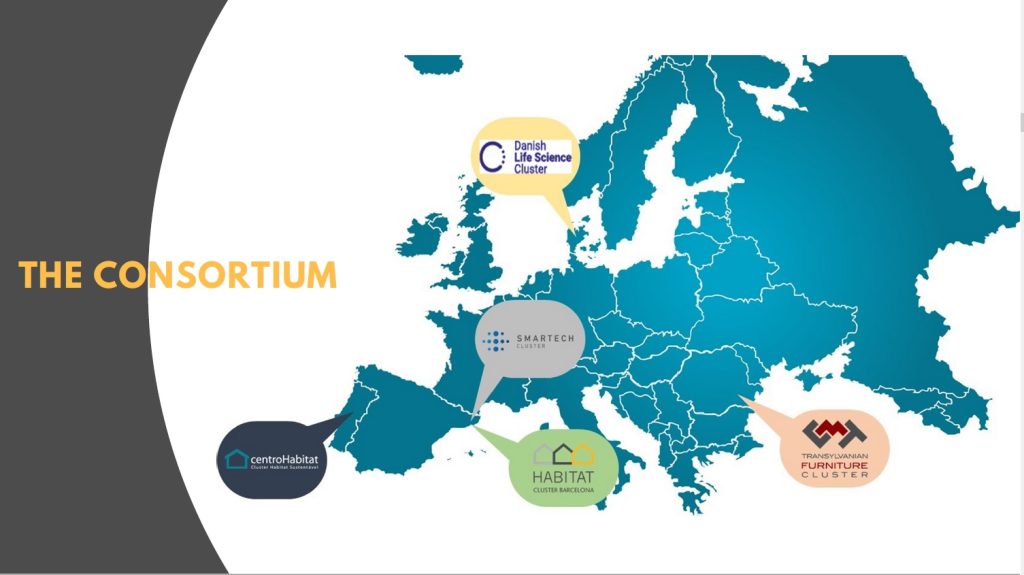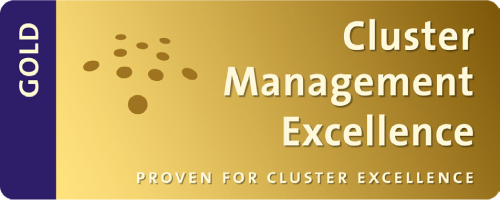Site web: exceliving.eu
EXCELIVING

Proiectul EXCELIVING se concentrează pe diferitele lanțuri de valoare ale sectorului de habitat dintr-o perspectivă trans-sectorială: materiale de construcții, mobilier și dispozitive de iluminat, automatizarea locuințelor etc.
În acest sens, EXCELIVING promovează o abordare multidimensională a mediilor de viață, concentrându-se pe un set de elemente cu impact direct asupra mediilor sănătoase, prietenoase cu înaintarea în vârstă și sustenabile.
Proiectul abordează provocările sectorului de spații locative, contribuind la promovarea unui ecosistem favorabil la nivel european, care să creeze un avantaj competitiv prin consolidarea transferului de inovații, excelența în gestionarea clusterelor și colaborarea interregională. Scopul final este de a transforma sectorul de habitat într-unul care e mai ecologic, mai competitiv și cu deschidere crescută spre internaționalizare.
Parteneri de proiect: Cluster Mobilier Transilvan – România, Habitat Cluster Barcelona- Spania, Smartech Cluster–Spania, Cluster Habitat Sustentável– Portugalia, Wellfare Tech– Danemarca
Proiect co-finanțat de Uniunea Europeană prin programul COSME, apelul „COS-CLUSTER-2020-3-03 – European Cluster Excellence Programme with ClusterXchange scheme connecting ecosystems and cities”.
Actualizarea strategiei individuale a clusterelor implicate în proiect (WP2, activitatea 2.2.)
Strategia pentru întregul parteneriat al proiectului, format din 5 clustere (WP2, activitatea 2.3.)
Organizarea vizitelor internaționale (WP5, activitatea 5.4): vizitele vor avea teme specifice, precum eficiența energetică, digitalizarea, sustenabilitatea și economia circulară în producția de materiale și spații de construcție, spații sănătoase etc.
Lider WP6: definirea unui plan de cooperare și durabilitate pe termen lung (activitatea 6.1) și elaborarea unui ghid de lecții învățate și recomandări pentru clustere și IMM-uri (activitatea 6.2.)
Elaborarea planului de comunicare pentru proiectul Exceliving (WP7, activitatea A7.1)
Pachetul de lucru 1: management și coordo-nare pentru activitățile din proiect
Pachetul de lucru 2: dezvoltarea unui plan strategic cuprinzător pentru construirea unui parteneriat puternic și pe termen lung
Pachetul de lucru 3: consolidarea capacităților clusterelor și îmbu-nătățirea abilităților de managemet
Pachetul de lucru 4: conceperea unui porto-foliu de servicii noi, cu valoare adăugată pentru IMM-uri, și furnizarea acestora
Pachetul de lucru 5: evenimente de mobilitate în cadrul schemei ClusterXchange
Pachetul de lucru 6: lecții învățate, sustenabilitate și cooperare pe termen lung
Pachetul de lucru 7: comunicare, diseminare și promovare a activităților din proiect
10 noi proiecte colaborative sau acorduri de cooperare sau acorduri de afaceri
100 de IMM-uri din sectorul de habitat care participă la evenimentele organizate prin proiect
10 servicii suport dezvoltate pentru IMM-uri
1 program de instruire organizat de parteneriatul clusterelor EXCELIVING
10 cursuri de instruire organizate de experți în domeniile vizate
12 evenimete organizate: C2C – 4, B2B – 4, C2B – 4
Îmbunătățirea abilităților de gestionare a clusterelor prin defini-rea unui program integrat de consolidare a capacității angajaților
Consolidarea relațiilor din cardul consorțiului și dintre IMM-urile ce sunt membre în clusterele implicate în proiect prin organiza-rea și participarea la evenimente B2B, C2C și de matchmaking
Sprijinirea cooperării interregionale între clustere și între IMM-uri pentru a stimula transferul de inovație și pentru a promova un sector de habitat mai inteligent, ecologic, mai competitiv și orientat spre internaționalizare
Crearea unui ecosistem favorabil pentru a promova noi parteneriate, proiecte inovatoare, transferul de inovații și pentru a facilita identificarea și crearea de noi oportunități pentru sectorul de habitat (mobilier, textile, decor)


